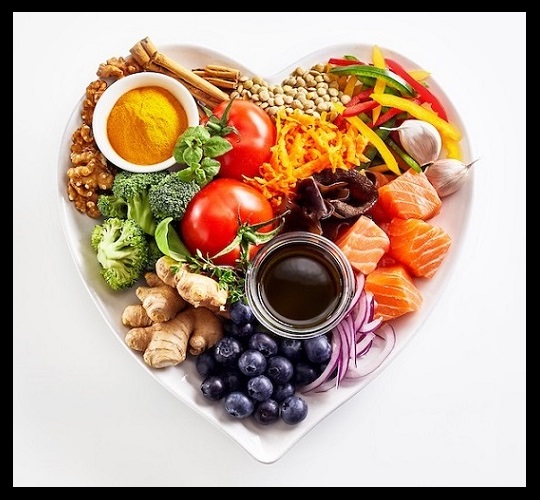Heart Healthy Diet

The Basics
By Brooke Sawicki, MS, RD, LDN
Outpatient Registered Dietitian
University of Maryland Baltimore Washington Medical Center
What you eat is very important in managing heart failure. If your doctor has told you that you have heart failure, they may have also recommended a "heart healthy diet." Do you know what that means?
A heart healthy diet has a few key parts:
- Eat foods from the main food groups: fruits, vegetables, lean animal or plant-based proteins, whole grains and low-fat dairy.
- Aim to eat a lot of different whole foods that are minimally processed. That means you should eat fewer foods that are pre-packaged or come from boxes and more foods that come from the outside aisles of the grocery store or from a farmer's market. Having a variety of whole foods in your diet helps you get the vitamins and nutrients that your body needs to be healthy. Processed foods tend to be higher in salt and sugar.
- Eat high-fiber foods throughout the day. These include fruits, vegetables, whole grains, beans, nuts and seeds. These foods help lower your cholesterol and helps you manage your weight.
- Choose healthy unsaturated fats from plants rather than unhealthy saturated fats from animal sources.
- When you are putting food on your plate, try to fill half of the plate with fruits and/or vegetables, a fourth of your plate with lean animal or plant-based protein and a fourth of your plate with whole grains.
Let's look at each of the food groups.
Fruits and Vegetables
Not only are fruits and vegetables naturally low in fat and calories, they are packed with a ton of nutrients like fiber, vitamin C, folate and potassium. You can eat fruits and vegetables that are fresh, from cans that are packed in 100% fruit juice or are low sodium, or from the freezer section without flavors or sauces. If you have kidney disease, talk to your doctor about the right amount of potassium for your body.
Grains
A lot of people think grains are bad for you. Actually, when eaten in moderation, they are a great source of energy and are packed with fiber, B vitamins and minerals. Try to eat whole grains, like brown rice, whole wheat pasta, whole wheat bread or oatmeal. Whole grains can help regulate digestion and help manage heart disease and weight.
Protein
There are many ways to get your protein – meat, poultry, seafood, eggs, beans, nuts, soy and seeds. Some of the nutrients we get from protein are B vitamins, iron, zinc and magnesium. Protein also helps build healthy bones, muscles, cartilage, skin, enzymes, hormones and vitamins, and helps prevent loss of lean body mass. Additionally, protein helps you feel full and satisfied. If you do eat animal proteins, make sure you choose lean cuts of meat and poultry because they are lower in unhealthy saturated fats. Fish and plant-based proteins like beans, nuts and seeds are good choices to eat throughout the week. Eating a lot of different of proteins is best.
Dairy
Dairy comes from milk and any product made from milk that keeps its calcium content, like cheese and yogurt. Dairy provides our body with calcium, potassium, vitamin D and protein to keep our bones healthy and strong. Fat-free or low-fat dairy options are best because they are lower in unhealthy saturated fats. If you can't eat or drink dairy, try non-dairy alternatives like almond milk. Just be sure that your non-dairy alternative is fortified with calcium.
For More Information
For more information and heart healthy recipes, check out The American Heart Association Website: https://www.heart.org/en
If you have specific questions about your dietary intake or would like more information on a dietary plan that is right for you, make sure you meet with a Registered Dietitian. They are the experts in the field! To reach UM BWMC's Digestive Health Center, please call 410-553- 8146.
